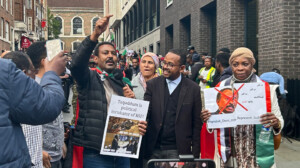Resistance committees plan ‘revolutionary escalation’ in Sudan
The Resistance Committees Coordination in Khartoum announced a comprehensive revolutionary escalation to press for the implementation of the demands of the Sudanese public who took to the streets by the hundreds of thousands last month.
 The March of the Millions in El Fasher, North Darfur on June 30 (RD)
The March of the Millions in El Fasher, North Darfur on June 30 (RD)
The Resistance Committees Coordination in Khartoum announced a comprehensive revolutionary escalation to press for the implementation of the demands of the Sudanese public who took to the streets by the hundreds of thousands last month.
16 coordinators of the resistance committees in Khartoum said in a statement that they held a lengthy meeting to assess the response to the demands of the March of the Millions of June 30.
They explained that the meeting dealt with imbalances of the current situation in the course of the revolution and the need to improve the coordination process among the resistance committees in the cities of Khartoum and the other states of Sudan to continue the peaceful struggle and the next steps of the joint coordination
It stated that it would engage in intensive meetings to discuss and coordinate the schedule of the revolutionary escalation as soon as possible to correct the course of the December 2019 revolution, calling on the people to actively participate.
Dr Mudawi Ibrahim, head of the peace axis at the University of Khartoum Forum for Development and Democratic Transformation, stressed the importance of rebuilding the Sudanese state and ensuring the participation of all Sudanese in managing the affairs of the country and the establishment of a national constitutional conference that represents a societal dialogue in which all Sudanese agree on the foundations for building the Sudanese state.
The participants in the meetings of the forum agreed that the Sudanese problem lies in the institutional building of the Sudanese state, noting that the national conference will discuss issues of citizenship, the relationship of religion to the state, forms of governance and the way in which Sudan would be governed, whether federal or otherwise, through a societal dialogue.
Ibrahim said that they came up with many recommendations on the issues related to social peace and stopping the war, which were discussed through arrangements and agreements with people through dialogue to reach a lasting peace through which the problem is addressed and agreement on the way of representation was also discussed.
Radio Dabanga’s editorial independence means that we can continue to provide factual updates about political developments to Sudanese and international actors, educate people about how to avoid outbreaks of infectious diseases, and provide a window to the world for those in all corners of Sudan. Support Radio Dabanga for as little as €2.50, the equivalent of a cup of coffee.












 and then
and then